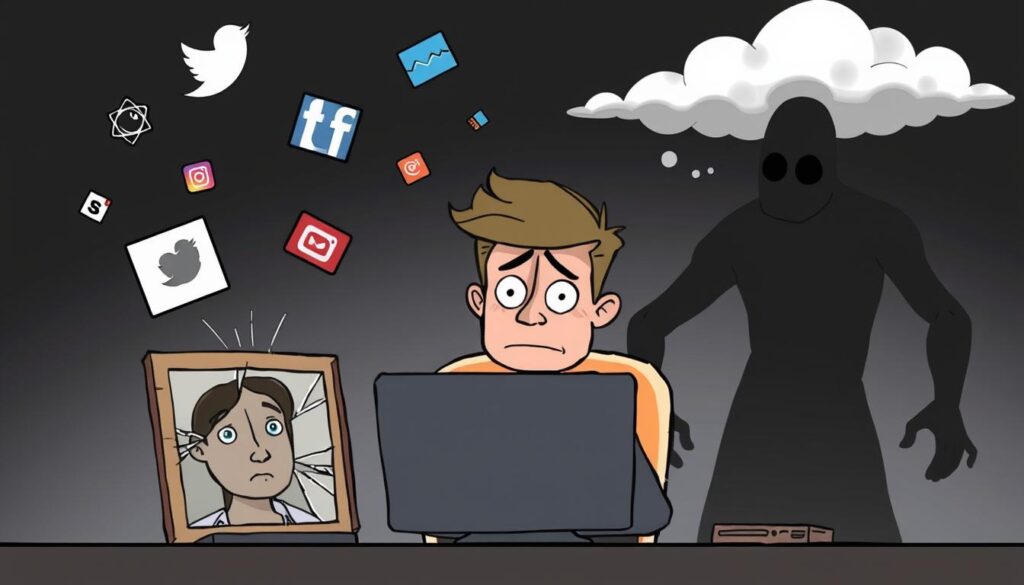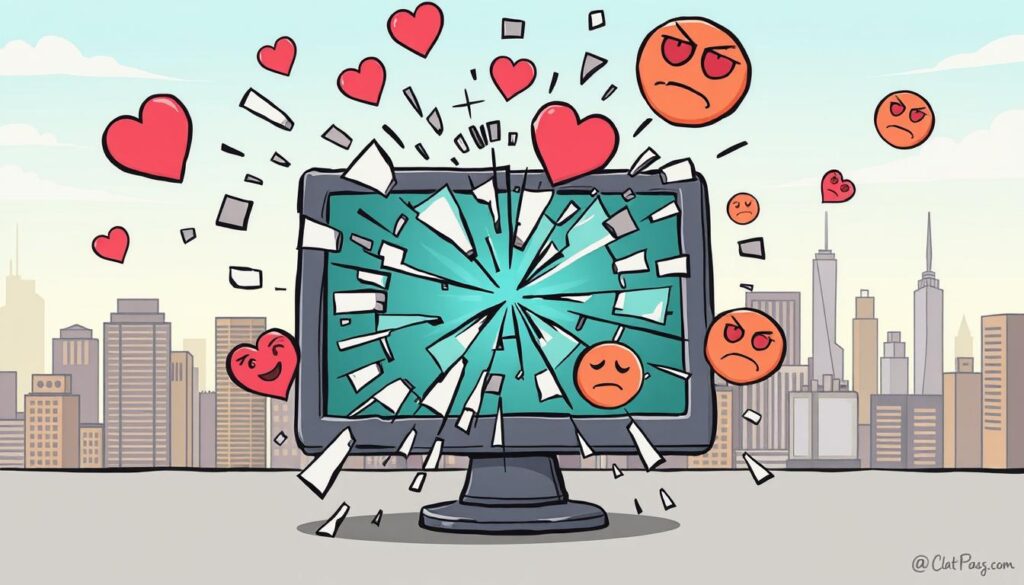Online defamation can harm your digital reputation and affect how people see you. False or misleading content online might be considered defamation. This is when someone spreads false information that damages your reputation. Defamation can be spoken (slander) or written (libel).
With more people online, there’s a growing need to protect against internet defamation. Knowing your rights and how to remove false content is key to keeping your online image safe.
In 1996, the U.S. Congress created the Communications Decency Act. This law helps deal with online defamation. Also, Google and other search engines have rules for removing content. These rules can help in certain situations.
Understanding slander and libel, and knowing the difference between public and private figures, is important. This knowledge helps you protect your online reputation. It also guides you on how to remove harmful content.
Understanding Online Defamation: Slander vs. Libel
In today’s digital world, defamation can be spoken slander or written libel. The legal terms might seem simple, but online defamation is complex. It’s vital to know the difference between slander and libel to safeguard your online reputation.
What Constitutes Slander in Digital Space
Slander is making false, damaging statements about someone verbally. Online, this can be spreading false rumors about someone’s health, business, or personal life. Social media, voice messages, and other platforms can quickly harm someone’s reputation.
Legal Definition of Libel
Libel is about publishing written defamatory content. This includes false Google reviews, social media posts, or letters to newspapers. The term “Twibel” describes internet-based libelous statements. Courts treat slander and libel the same, needing proof that the statements were false and intended to harm.
Key Differences Between Online Slander and Libel
- Slander is about spoken defamatory statements, while libel is about written or published content.
- Slander can be spreading false rumors through digital platforms, while libel includes fake social media posts, negative reviews, or written defamation.
- The legal requirements for slander and libel are similar, needing proof that the statements were false and harmed reputation.
- The fast spread and lasting impact of online defamation, whether slander or libel, can be hard to handle for victims.
It’s key to understand slander and libel online to protect your digital reputation. Knowing the differences and legal aspects helps victims take action against online defamation.

How Online Defamation Impacts Your Digital Reputation
In today’s world, online defamation can greatly affect your digital image. Negative content in search results can change how people see and interact with you. This can impact both your personal and professional life.
For businesses, online defamation can cause a loss of customers and harm relationships. The internet’s anonymity makes it hard to fight back against false content. Knowing your legal rights and remedies is key to protecting your online reputation.
Online defamation is different from traditional defamation. It can happen on social media or websites. Studies show that fixing online content is harder than in traditional media. This is because information can easily spread online.
The effects of online defamation can be very harmful. Here are some examples:
- Badame v. Lampke: Defamatory comments in the Charlotte sewing machine market hurt the plaintiff’s business.
- Bongiovi v. Sullivan: Defamation during plastic surgery consultations led to $250,000 in damages for the plaintiff.
- Cohen v. Hansen: A cyber libel case resulted in $35.3 million in damages for the plaintiff.
- Rombom v. Weberman: Plaintiffs got $8,510,000 in damages for defamation on a website, with a permanent injunction to remove the content.
These cases show how serious online defamation can be. With more people facing online harassment and defamation, protecting your digital reputation is more important than ever. Ask us for help.

Legal Rights to Have Online Slander Removed
When dealing with online slander, both individuals and businesses have legal rights. The Communications Decency Act (CDA) of 1996 helps protect online platforms. But it also sets the stage for lawsuits to remove harmful content.
State laws also play a role in fighting defamatory content. It’s important to know the difference between public and private figures. Public figures need to prove malice, while private ones only need to show negligence. Some places even protect accurate reporting on public issues.
Understanding the Legal Nuances
Dealing with online slander removal laws can be tricky. You need to think about time limits, filing costs, and the “Streisand Effect.” But knowing the laws and best practices can help you fight back against harmful content.
- The statute of limitations for defamation in New York State is one year.
- DMCA Takedown Requests can be used to request the removal of copyrighted content from a website or platform.
- Filing fees for initiating a lawsuit in Supreme Court in New York State include $210 for an index number, $95 for a Request for Judicial Intervention (RJI), and $45 for motions and cross motions.
By using these legal rights, you can protect your online reputation. And remove harmful content from the internet.
Effective Strategies for Content Removal from Search Results
Dealing with digital defamation or reputation damage online can be tough. Removing harmful content from search engines is a key step in online reputation legal protection. But, it needs a smart and detailed plan.
One way is to reach out to website owners or ISPs to ask for content removal. In the U.S., website owners can decide what to do with user content. They might agree to take down defamatory or unauthorized content. Also, the Digital Millennium Copyright Act lets for copyrighted material removal without permission.
If website owners won’t cooperate, you might need to go to court. You could get a court order or file a DMCA takedown notice. Google also has rules for removing certain types of content from its search results.
| Removal Strategy | Key Considerations |
|---|---|
| Direct Contact with Webmasters | Website owners have discretion over user-generated content under the Communications Decency Act |
| DMCA Takedown Notices | Effective for removing copyrighted material without consent |
| Legal Documentation/Court Orders | Required for compelling removal in uncooperative cases |
| Google Content Removal Policies | Strict criteria for removing personally identifiable information, explicit material, and demonstrably false claims |
These methods can help protect your online reputation and remove digital defamation. But, remember that content might still be on the original site, even if it’s gone from search engines. So, fixing the problem at its source is key for lasting online reputation management.
Working with Internet Service Providers and Website Owners
When dealing with online defamation or slander, contacting website owners or ISPs can be a good first step. A well-written letter from a lawyer might get the content removed. But, it’s key to check the website’s rules and point out any violations.
Direct Contact Approaches
Reaching out to website owners or ISPs can work, but you need to know their rules. Some sites need a court order to remove content or reveal who posted it. Knowing these legal steps is crucial for removing content.
Legal Notice Requirements
When contacting website owners or ISPs, following legal notice rules is important. You must give details about the defamatory content, show its harm, and explain why it should be removed. Following these steps can help get a positive result.
DMCA Takedown Procedures
The Digital Millennium Copyright Act (DMCA) helps with copyright issues, which can apply to some defamation cases. Knowing and using the DMCA takedown process can help remove content from websites and search engines.
Managing your online reputation needs a smart plan. By knowing how to legally remove online defamation and slander, you can protect your digital image. This is important for both individuals and businesses. Ask us for help.
Legal Options When Other Methods Fail
When other ways to remove online defamation don’t work, you might need to go to court. Before you start a lawsuit, think about where the case will be heard. Also, consider the context of the statements and if you’re a public or private figure. These things can change how the case goes and what the outcome might be.
Courts might ask you to show you have a strong case before they help find out who posted the defamatory content. It’s hard to prove you were harmed by the defamation. You’ll need a lot of evidence to show the damage. Also, the person being sued might try to use anti-SLAPP motions, which can make things harder.
If legal action doesn’t remove the defamatory content, you might look into other ways to protect your online reputation. Creating positive content to push down negative results is one strategy. It’s important to protect your online presence and explore all legal options to avoid long-term damage. Ask us for help.

